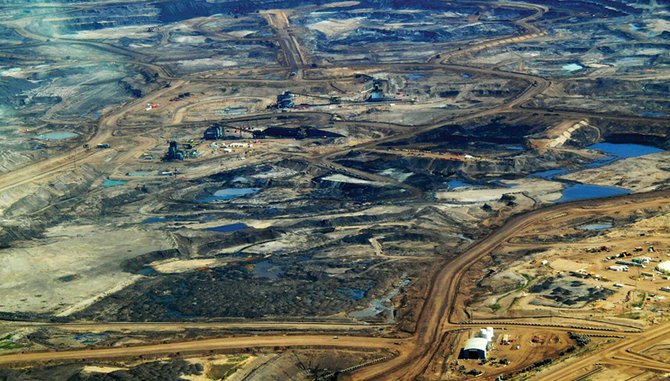This story appeared on The Daily Climate.
NEW YORK - I could not help thinking of David versus Goliath earlier this week as I was working on a letter to Jose Manuel Barroso, President of the European Commission.
I was writing about the tax that Europe applies to unconventional fossil fuels in its Fuel Quality Directive: Will it account for all the emissions during the mining and processing of such fuels or will they pretend that energy from tar sands and oil shale is the same as conventional oil?
It matters—a lot. If total emissions are counted, the fees tacked to oil from tar sands or tar shale will make that carbon-intensive fuel less competitive in the market. Add a rising fee on carbon, and these dirtiest of fuels will be the first to be eliminated and replaced by clean energy and energy efficiency.
Tar sands production today is moderate, but there are plans to quintuple the rate of extraction over the next decade. Tar sands operations today are ugly enough, but if that expansion happens and infrastructure is put in place to carry the products to market, we surely will see a monstrous pillage of the land.
Massive Carbon Load
From the climate standpoint, we cannot accept the massive carbon load associated with unconventional fossil fuels without guaranteeing climate disasters. Conventional oil and gas should be the transition fuel to a clean energy future, and they could be that, if we put a rising fee on carbon.
And this brings me to the biblical tale. "David" in this case is the Friends of the Earth Europe contingent, led by Elizabeth Drury, a small, determined middle-aged woman I met during a trip overseas last month. She's supported by a few young people, and they're making gains. Maybe.
The European Commissioner for Climate Action, Connie Hedegaard, suggested to us that she's determined to have honest accounting of emissions from all fuels. The officials of most key nations we met seemed to be very understanding and supportive. So it seems that the vote should go the right way.
But wait: Will there be a vote?
Enter "Goliath." The fossil fuel industry does not have much to fear in the well-oiled, coal-fired U.S. Congress. And maybe it's not much different in Europe. The New York Times last week published two photos of big-boy lobbyists, champagne in hand, celebrating the first anniversary of their Houston-based law firm's Brussels office.
Working Behind the Scenes
They were striking photos in part because Goliath, for all his size, likes to work behind the scenes. But you can see the fruits of his labors in the daytime: Just turn on your television to see messages about safe, dependable tar-sands and coal.
Perhaps the United States, as well as Canada, will side with unconventional fossil fuel interests. It would not be the first time that promises and speeches about climate change from our elected representatives turned out to be greenwash.
But this need not prevent Europe from standing tall.
This is not meant to discourage you. "David" can win this eventually, but we need many Davids. David's chief weapon needs to be exposing the truth. The Harper administration in Canada seems to be a handmaiden of the fossil fuel industry. It is not certain the same is true for the Obama administration.
Reason to Hope
The fossil fuel industry will lobby the Obama administration to pressure Europe to accept dirty oil as clean, and it will lobby Obama to approve the Keystone XL pipeline to open markets for tar sands oil. The basis for optimism is the fact that the matter has been exposed here in the United States. People are concerned.
There is reason to hope that Secretary of State John Kerry will advise Obama to not approve the pipeline. Surely they understand their legacies are at stake.
However, we must recognize that all individual fossil fuel decisions—pipelines for tar sands, trains and export facilities for coal, water for fracking, and so on—are overwhelmed by the need for a simple, rising, across-the-board domestic carbon fee collected at the source: The well-head, the mine, the port-of-entry.
Without a carbon fee, any success in stopping a fossil fuel project will be short-lived. With a rising carbon fee, we will eventually win on all of these fronts, with the highest carbon sources falling into disuse first.
The Citizens Climate Lobby is working to create the political space for such a discussion and decision, with outposts from Montana to Kansas to New York and every place in between. It is a grass-roots organization advocating for a simple rising carbon fee, with 100 percent distribution of the proceeds to the public.
It's exactly what is needed to spark our transition to a clean energy future. Nothing will be left to make the government bigger. But we need help pushing the Goliaths out of the way.


